THE BRIGHT SPOT OF 2020: INNOVATORS
By Dara Klatt, with Maria Blanco, Asa Hiken & Catherine Trifiletti | Portraits by Tony Powell
There is a certain fortitude in innovators’ eyes. Stare into the pupils of our tech 25 leaders and you’ll see dogged determination across the gamut—the kind of look that says, “go ahead and push me down. I’ll get right back up.” Again. And again. And again. It’s this kind of resilience that shines—even “smizes”—during a tumultuous time of global pandemic, near economic collapse and heightened civic and social division. This year, we looked to a diverse line-up of innovators and disruptors in our area for a real-time illustration of how to tackle adversity. While some have focused on scaling their business with speed, others have quickly pivoted. All of them have forged ahead, focusing on the (virtual) future.
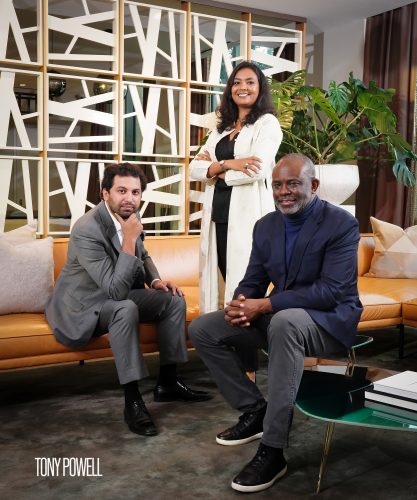
Junaid Shams, Dipanwita Das and Aaron Saunders (Photo by Tony Powell).
Jenny Abramson
Founder and Managing Partner, Rethink Impact
Jenny Abramson is not your average managing partner, but her firm isn’t your average venture capital investor either. Investing in tech start-ups led by women, Rethink Impact is trying to disrupt a patriarchal trend in VC financing. Abramson points out that one of the consequences of the pandemic is that the first half of 2020 saw a 22 percent year- over-year decrease in the percentage of VC investments going to female-founded companies, with underrepresented entrepreneurs being impacted the most. With nearly $300 million in assets, Abramson is hoping to change the tide.
Rethinking representation: “Diversity isn’t a “nice to have” but rather an essential competitive advantage, leading to both greater innovation and greater returns.”
Fun fact: “When not in a pandemic, I moonlight as a girls’ soccer coach.”
Coolest tech trend right now: “Tech-enabled mental health support.”
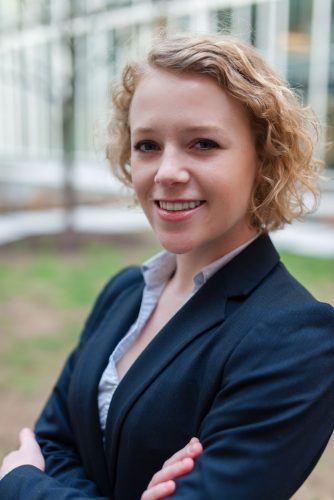
Carleigh Berryman
Carleigh Berryman
Founder and CEO, Viva Vita
Carleigh Berryman is a 23-year-old CEO who wants to make life more fulfilling for all the “grannies and grandpas”—as she charmingly puts it—through a wealth of possibilities that is VR technology. Berryman was motivated by her own grandmother, Glenda, who once expressed that she had no reason to get out of bed in the morning. Berryman got to work and won a $5,000 grant through The GW NewVenture Competition with a straightforward pitch: a service that delivers and facilitates virtual reality programs for retirement communities. But most importantly, it returns dignity and joy to a community longing for experiences that are seemingly out of reach. After winning the grant, VivaVita began delivering VR to hundreds of seniors in the DMV. Glenda approves.
Expanding Viva Vita’s reach: “To help those who ‘feel trapped,’ ie. people in dialysis (like my late paternal grandmother) or chemotherapy (like my co-founder’s grandmother and aunt), or even just a scary dentist’s chair (me, last week).”
A fitting motto: “Life is for living.”
VR recommendation: Vader Immortal on Oculus.
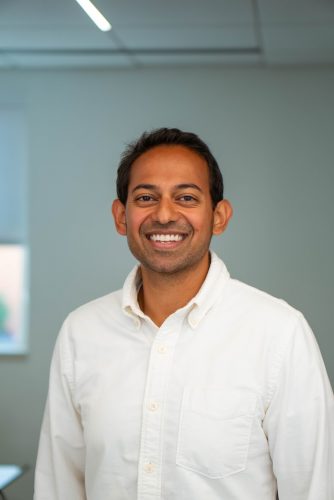
Kiran Bhatraju
Kiran Bhatraju
CEO, Arcadia
As households crank the heat this winter, Kiran Bhatraju, CEO of Arcadia, is helping households take control of utility bills with energy efficient products and services. The company recently launched a peer-to-peer energy insecurity support system and a program to help businesses reach their sustainability goals and offset carbon emissions remotely. Founded six years ago, Arcadia Power raised $30 million in its Series C at the end of 2019, has increased its team to 135 people, has purchased over five gigawatt hours of renewable energy and helped build 300 megawatts of new community solar.
Superpower goal: Speed.“Building product, getting to market, and even shifting strategies faster than the incumbent is the only built-in advantage any new company has on the market.”
Surround yourself with: “People who are passionate about change.”
Coolest tech trend right now: “Massive indoor vertical farming to grow veggies.”
Wayne Bovier
CEO, Higher Digital
With more than a decade of experience in the global higher education sphere, Bovier is well suited to advise institutions on how to improve their approach to digital-first initiatives. Through strategy and product development, the entrepreneur delivers solutions for his clients’ biggest hurdles. Bovier previously held leadership positions at education tech giants Laureate Education, Ellucian and Blackboard. His company, Higher Digital, is focused on helping higher education institutions digitally transform through a blend of consulting, software and analytics. “As you might imagine,” he says, “we sit at the epicenter of digital disruption that COVID has accelerated in the education industry.”
Advice to budding entrepreneurs: “There is never a ‘perfect’ time and life is short, so take the plunge when the opportunity presents itself. Also, do not worry about failure.”
Describe innovation in the Washington, D.C. area over time: “Back then [in the mid- nineties], the tech/software community (e.g., Netpreneurs and New Media Society) was small and intimate; now, the community has seen amazing growth and offers a ton of networking and financial opportunities.”
Words to live by: “Hardships often prepare ordinary people for an extraordinary destiny.” – C.S. Lewis
Favorite app: “My Fitbit watch and Fitbit app on my Android phone. I am healthier and get better sleep now that I am tracking and using the data.”
Fun fact: “I lived through a coup in Venezuela in 2002.”

Maisha Burt (Photo by Tony Powell).
Maisha Burt
Founder and CEO, WorkChew
After experiencing the isolating nature of remote work before the pandemic hit, Burt crafted the platform WorkChew to partner with local restaurants and hotels like Viceroy, Pinstripes, and Yours Truly to provide fully-serviced workspaces for mobile workers. Workers who join get high-speed wifi, designated seating and all the necessary health and safety protocol; while hosting hospitality venues get extra foot traffic. On a grander scale, Burt says it all works to “breathe life back into the local community.” She just launched an enterprise offering for companies looking to set up employees with WorkChew. The company was recently selected by Google to represent them in their 2020 Economic Impact Report and beat out hundreds of applicants for a spot in the Comcast NBCUniversal LIFT Labs Accelerator.
Words of wisdom: “Entrepreneurship is a marathon so it’s important to fail fast, keep learning, never stop dreaming and never give up.”
Coolest Tech Trend: “High-tech food (plant-based meat substitutes).”
Dipanwita Das
Co-Founder and CEO, Sorcero
In 2020, Dipanwita Das’ language intelligence platform Sorcero surged from 11 to 31 team members, hit $1 million in annual recurring revenue, and raised $3.5 million. Sorcero won the EU’s leading Digital Health accelerator, Startup Creasphere, in partnership with Plug and Play and Roche Diagnostics, and Das was selected as a Sir Edmund Hillary Fellow, one of the world’s leading programs for social entrepreneurs working on global challenges. It’s been quite a year, indeed. She credits this success to the relevancy of her product—which provides the tools to build new workflows for a remote work environment—as well as the collaborative environment she fosters in her workplace. “Establishing a great workplace culture is absolutely essential when you are building a company,” she says.
Geek mode: “I write my diary in Elvish.”
A 2020-appropriate motto: “Don’t panic.”
Coolest tech trend right now: Batteries for electric cars and home power storage.

Michael Floyd
Michael Floyd
CEO, AfterrHome
Great confusion calls for great innovation. At the start of the pandemic, Michael Floyd’s AI-powered home inspection company, AfterrHome, was forced to postpone its launch after home-buying projections declined and inspectors decreased their availability. Instead of waiting out the storm, Floyd developed the company’s remote inspection platform in addition to strengthening the AI that will be used to scan neighborhoods for environmental hazards. The hard work paid off, and in September, AfterrHome won the top prize at DC Startup Week’s pitch competition, while also receiving a host of in-kind rewards and a much-needed confidence boost from local industry professionals. Floyd’s goal is to raise up to $250,000 before launch, and in order to circumvent investment disparities against Black business owners, he started his own fundraising campaign on WeFunder.
Advice to budding entrepreneurs: “Success takes discipline. It sounds cliche?, but there are new ways that your discipline is tested every day.”
In the neighborhood: “D.C. is a melting pot of people from all different cultures wanting to collaborate and innovate. You could go on a coffee run to Starbucks and come back with a co-founder.”
Fun fact: “I’m a chess master! I’ve played the game since I was six years old.”

Shavini Fernando (Photo by Tony Powell).
Shavini Fernando
Founder and CEO, OxiWear
Rebel With a Good Cause
It was “asthma,” the doctors said. They suggested inhalers, bronchodilators, steroids, but Shavini Fernando, who was being rushed to the hospital at least once every week to nebulize, knew something else was wrong. Then, in 2015, after literally turning blue on a hike in her home country of Sri Lanka, Fernando saw a cardiologist and was diagnosed with severe pulmonary hypertension (PH). Worse, the condition could have been prevented if her atrial septal defect (ASD) had been noticed earlier. Worst of all, she was given two years to live.
“My parents and I asked about international treatment options,” Fernando says. “But the cardiologist told me to resign myself to what little time I had left.”
A lifelong rebel, she didn’t listen. Instead, Fernando gathered her visas, flew to Baltimore, Md. and started what has since become five years of successful treatment at Johns Hopkins University. Not only is she more confident in her health today than she has been in years, but she’s also created a device to help others feel the same security. OxiWear, based in Arlington and due out in the second quarter of 2021, is a stylish ear- wearable that monitors oxygen levels, alerts the user if depletion is detected, and then activates a personalized emergency plan.
“Patients with PH are prone to silent hypoxia,” Fernando says.“You have no idea when or where it will happen.” With OxiWear, users will know exactly when it is happening, and will thus be situated for better outcomes.
While Fernando’s hand may seem cruelly dealt, she doesn’t see it that way. Instead, she believes in the power of optimism, that a positive attitude attracts a universe of positivity.
“If I wasn’t diagnosed with PH,” she says,“I would not have designed OxiWear.” It’s an inarguable statement, but beneath its obviousness is a profundity that maps Fernando’s worldview. “I don’t worry about what has already happened in life. I can’t change it, so I just live for the day and plan for tomorrow.”
It is this radical mindfulness that has helped Fernando traverse the disruptions caused by the pandemic. In April, at a crucial moment in OxiWear’s funding, she had to pull out of a $500,000 round due to the rise of Covid-19. She could have wallowed in her misfortune, but remained patient and optimistic, and when the time was right she reconnected with life science investors and has been acquiring funds ever since.
“I will release this device no matter the difficulties,” she says, “because I’m on a mission to save lives and to restore confidence to my fellow patients with PH.”
Her timing couldn’t be better, for research has found that Covid-19 patients are displaying signs for silent hypoxia before they develop symptoms. While, for OxiWear, this means a wellspring of new customers such as doctors and hospitals, for Fernando, it means heightened need, and more reason to stay the course.
A word to investors: “I myself am a user of OxiWear, I’m doing this to save myself as well as others like me, so aren’t I the best person to trust in the development of this device? If investors think they are putting their funds at risk, I would respond by saying that I’m putting my life at risk.”
Stacked re?sume?: “I have three Master’s degrees in technical, communications and business areas, and have 15 years of work experience in project management and as a lecturer for universities.”
DMV difference: “I’ve received so much help and advice from the DMV-startup and business communities, especially from the Georgetown University community. They believed in me and my vision. Even if we later expand to other regions, we will always be headquartered in Virginia.”

Bryan Gernert
Bryan Gernert
CEO, Resonate
Bryan Gernert’s consumer intelligence firm Resonate uses AI to compile consumer data and paint a picture of the shifting attitudes of consumers in real-time (i.e. shoppers in lockdown ordering another set of leggings … and maybe an RV). Gernert leads with the understanding that businesses need fresh, fiercely updated data. In America’s current economic crisis, Resonate has collected information on issues such as consumer perception, purchasing power and eagerness to resume normalcy—and it plans to have a record year across every metric of the business. A 2019 finalist
of Ernst &Young’s Entrepreneur of the Year award, Gernert has made Resonate a destination for data experts. In addition to earning a spot on NVTC’s 2018 “Tech 100” list, the company is also a four-time Virginia Business “Top Workplace” and a 2018 “Top Workplace” as chosen by the Washington Post.
3 days per year: Resonate launched a program for every employee to get three paid days per year to donate their time to a cause they’re passionate about.
Advice to budding entrepreneurs: “Don’t ever put in the level of effort that is reasonable; being reasonable is average, and to be a successful entrepreneur, you need to do the unreasonable.”
Pet pal: “My family currently has three times more animals living in our house than humans—and we have five humans.”

Cristine Gollayan and Juan Pablo Segura (Photo by Tony Powell).
Cristine Gollayan
President-elect, Women in Technology; and Senior Manager, Sony’s Global Information Security
During her “day job,” Cristine Gollayan manages the deployment of security tools and programs throughout Sony’s global operating companies in the District. She arrived at Sony after managing security programs for IBM and Verizon and started her career as a software engineer at Sprint coding in COBOL. She is passionate about her role as STEM advocate for the Women in Technology (WIT) organization. WIT partners with organizations such as STEM For Her, which offer unique programs for young women to build drones, create cyberattack simulations, automate automobile parts, and lead conversations on innovation and disruption. WIT is also launching a podcast in 2021 to expand discussions around women in STEM. Look for more to come so that, as Gollayan hopes, WIT becomes “a universal acronym in corporations.”
Technology is … “the future and we need to ensure that women are represented and are part of shaping it.”
Girl goals: “Making earth-shattering changes, instead of trying to shatter glass ceilings.”
Fun fact: “I’ve judged for Miss America and Miss World Organizations”
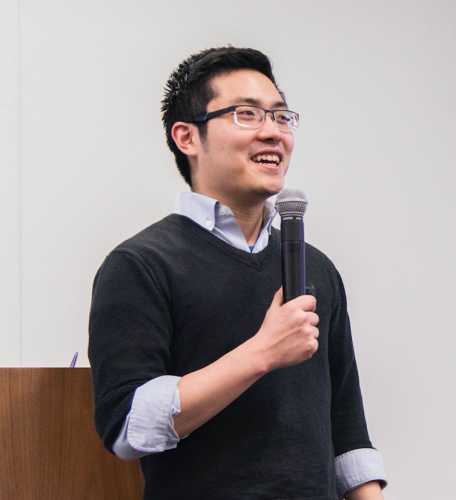
Tim Hwang
Tim Hwang
CEO, FiscalNote
The 28-year-old wunderkind has no shortage of accolades on his resume. The son of South Korean immigrants attended Thomas Wootton High School in Rockville, Md. where he developed an interest in the political machine. As a teen, Hwang worked on then-unlikely candidate Barack Obama’s presidential campaign. He eventually served as president of the 750,000-member National Youth Association and was elected to the MCPS Board of Education, helping
to oversee a budget of over $4 billion. After a church mission to Guatemala, he founded the social enterprise Operation Fly, Inc., which won him the Ernst &Young Entrepreneur of the Year Award.
Currently on leave from Harvard Business School, the Princeton alumnus has spent the last seven years growing FiscalNote with two friends from high school. “We’ve come a long way since we bootstrapped our earliest product while working out of a single Motel 6 room in Silicon Valley to now employing roughly 500 people across offices in the U.S., Belgium, India and Korea,” Hwang says of his company’s humble beginnings. The tech and media company uses big data and AI to provide information services and software to connect clients to relevant government policy. In addition to dozens of Fortune 500 companies, trade associations and non-profits, the company’s clients include every member of the House and the Senate and the United States Congress.
Innovation in D.C.: “Whether it’s working for a non-profit or in the halls of Congress, I think that altruistic desire to improve the human condition is well represented across the DMV. Not everyone agrees on what is best for society or how to get there, but the confluence of these types of people with a similar sense of purpose engenders an environment conducive for more responsible and sustainable innovation.”
Covid consequences: “Because we exist at the intersection between policy and technology, FiscalNote has seen a significant uptick in people and organizations who, now more than ever, need to be connected to their governments. In particular, our digital advocacy product has seen a large increase in usage as associations and member organizations have been investing heavily in advocating at the local, state, and federal levels to ensure that their voices are heard with regard to Covid-19 and other critical issues impacting them right now.”
Words to live by: “If I had asked people what they wanted, they would have said faster horses.” – Henry Ford
Favorite app: Spotify
Fun fact: “I’ve been to every state in the country.”
Coolest tech trend right now: “Conversational AI – with the growth of wireless headphones (AirPods, etc.) and conversational devices at home and in the car (Alexa, etc.), the next frontier of computing will start to shift towards interactions via voice activation.”
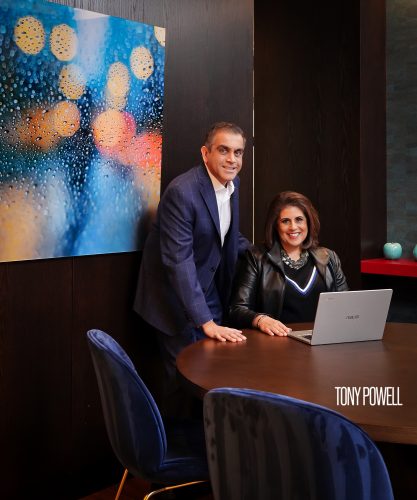
Vinay Bhargava and Anjali Kataria (Photo by Tony Powell).
Anjali Kataria and Vinay Bhargava
CEO and President, respectively; Mytonomy
Anjali Kataria and Vinay Bhargava are a power couple of the DMV tech scene. With a product that delivers healthcare guidance in an easy-to-understand video format, the tech duo experienced rapid success when the pandemic struck. Suddenly, telehealth services were in high demand, skyrocketing from five percent telehealth visits to 30 to 40 percent. In fact, they were listed in Inc. 5000’s fastest growing companies list for the first time this year, after experiencing a 150 percent company growth. In Kataria’s words,“what would have taken five years, happened in five weeks.”
The lightbulb moment: Kataria struggled to navigate the healthcare system when her mother became ill. When her husband was designing a virtual engagement platform using video, Kataria marveled at its potential if applied to the healthcare field … and Mytonomy was born.
Kataria’s advice for building a product: “Listen to what your customers like and don’t like, where it improves their world and how it could be better. This is liquid gold. Then act on what you learn!”
Bhargava on working with his wife: “You don’t have the conflicts that other founders typically have, and we have great material for a new sitcom now.”

Ahva Sadeghi
Ahva Sadeghi
Co-Founder and CEO, Symba
Ahva Sadeghi wasn’t about to let summer internships be another casualty of the coronavirus. Her start-up company, Symba, which pairs companies with remote interns, launched in 2017, and was poised to be the resource students needed to access opportunities and funding. After Symba launched into action with a campaign called #SaveInternships, the company’s demand multiplied ten-fold, its team doubled and it was named a leader forging the remote work revolution forward by Forbes. Sadeghi herself was named in Forbes 30 Under 30 and has been recognized as a John Lewis Fellow for Civil and Human Rights, and a Global Entrepreneur Scholar by the U.S. Department of State.
Even when socially-distant: “People should be better off because they come into contact with you.”
Talents: “I am an award-winning cellist!”
Coolest tech trend right now: “Increased accountability for diversity and inclusion in tech.”
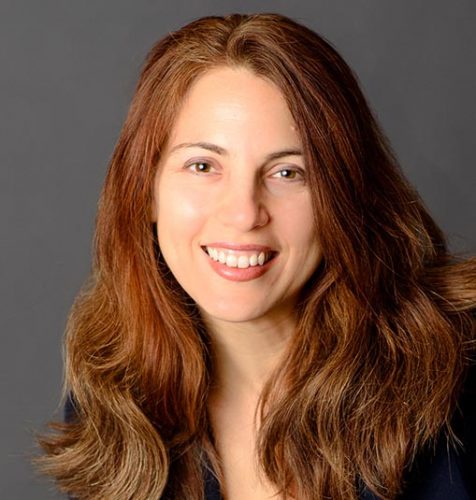
Roselle Safran
Roselle Safran
Co-Founder and CEO, KeyCaliber
KeyCaliber offers strategy for cybersecurity executives centered on three key questions: (1) What do they need to protect? (2) How are they currently doing? (3) How can they improve? For CEO and co-founder Roselle Safran, this type
of assessment would typically be drawn out, expensive and resource-draining, but KeyCaliber applies data science to the problem providing automatic, real time answers. The fledgling company recently took home the top prize at the 2020 Vinetta Project DC’s Venture Challenge.
Covid upside: “With many employees now working remotely, CEOs and Boards of Directors are better at understanding cyber risk and the importance of cybersecurity.”
Words to live by: “I measure wealth in experiences, not monetary currency.”
Favorite app: Duolingo
Fun fact: “I have visited 60 countries.”
Coolest tech trend right now: ”While we’re particularly focused on applying machine learning in our product for cybersecurity use cases, I’m also fascinated by how data science is tackling issues in the healthcare space, from Covid-19 to cancer and beyond.”
Mehul Sanghani
Founder and CEO, Octo
Just this fall, Mehul Sanghani “formalized” his brand, dropping “Consulting Group” from Octo’s title; helped secure a four-year, $25 million contract to provide IT support to the Transportation Security Administration (TSA); and hosted a virtual STEAM expo (Science, Technology, Engineering, Arts, and Mathematics) for underrepresented students throughout the DMV. Since its inception in 2006, Octo has delivered IT strategy and business transformation initiatives to a multitude of federal government agencies. Sanghani, a Virginia native and Virginia Tech grad, also has a passion for inspiring local youth. He is partnering with his alma mater to build an artificial intelligence center for their new Innovation Campus in Arlington and recently donated $1.5 million to launch an online food bank service for students who experience food insecurity.
Motto: “Success isn’t owned, it’s leased, and the rent is due every day.”
Local talent: “I believe we have an underrated talent pool in D.C. We have a highly educated, creative workforce filled with people who are drawn to support government missions.”
To be successful … “We need a diverse talent force.”
Aaron Saunders
Founder and CEO, Clearly Innovative Inc. & Inclusive Innovation Incubator (In3)
It’s no secret that startup investing has a race problem. Black entrepreneurs receive less than one percent of venture capital dollars in the United States. And in the past two decades, only 200 Black and Latinx founders have raised more than a million dollars. So, Aaron Saunders moved to fix the problem with his Inclusive Innovation Incubator. Now pivoting to a purely online platform after the pandemic ravaged activity at its physical workspace, In3 is offering a slate of business bootcamps, workshops, programming classes and Esport events while staying committed to educating and cultivating Black and under-resourced entrepreneurs. For his work, Saunders was recently nominated as a 2020 Technical.ly Culture Builder of the Year.
Words to live by: “Move fast, make decisions—you are smart enough to make adjustments along the way.”
More needs to be done: “Efforts to improve diversity have been about trying to pick winners instead of creating communities for winners to grow, learn, and be successful.”
Coolest tech trend right now: “Virtual Reality (VR). I just got my Oculus Quest 2 and I love it!”
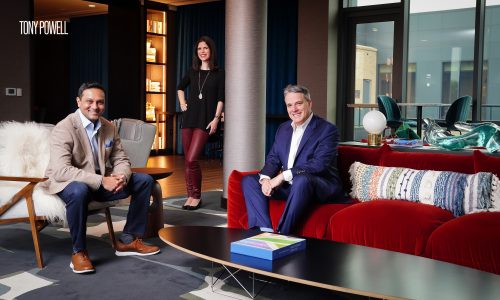
Mehul Sanghani, Jenny Abramson and Wayne Bovier (Photo by Tony Powell).
Juan Pablo Segura
CEO, Babyscripts
Named a “healthcare transformer” by Startup Health, a “wireless lifechanger” by the Cellular Telecommunications and Internet Association and an “up-and-coming industry leader” by Managed Healthcare Executive, there is no question that Babyscripts has received well-deserved attention. The startup’s model for prenatal and postpartum care was developed to enhance the doctor/patient relationship virtually throughout the duration of low-risk pregnancies. The app engages OBGYNs to offer provider-approved tasks related to nutrition, exercise and other behaviors to patients.
Covid upside: Babyscripts enrollments have grown eight times higher than normal over the past six months. “It’s a tragedy that it’s taken a global pandemic to shed light on the need for virtual care, but it’s also opened up pathways to reimbursement and adoption that were huge barriers pre-Covid,” CEO Juan Pablo Segura says. “We’re looking at a landscape that is much more open to using digital solutions to manage health.”
Life motto: “If not now, then when?”
Favorite app: “The Philz coffee app.”
Fun fact: “I’m obsessed with doughnuts.”
Coolest tech trend right now: “VR. I can’t get enough of it.”
Junaid Shams
Founder and CEO, Rooam
Reversing course from his plan to become a spinal surgeon, Shams didn’t expect that after graduating from George Washington University’s School of Medicine he would be transforming a successful startup into a full-fledged business powering contactless payments for Fortune 500 brands. Rooam, which was initially built as a “social payments” solution—a way to see which bars/restaurants your friends were frequenting—turned into an enterprise-level contactless payment method. In the Covid-19 era, Shams’ company is certainly not the only player in the contactless payment game, but he is confident that his technology and strong development team make Rooam a cut above the rest. The entrepreneur has received numerous national accolades, including Bloomberg Businessweek’s Top 25 entrepreneurs
under 25 and Under30CEO’s Top 30 Most Influential Entrepreneurs under 30. Of the future, Shams says, “We’re built to scale and innovate.”
Notable clients: I.M.P. (9:30 Club, Anthem); Sacramento Kings NBA team, Live Nation
Fun fact: The name Rooam was created after 300 other ideas fell short.
Favorite app: Tetris
Coolest tech trend: Ghost kitchens
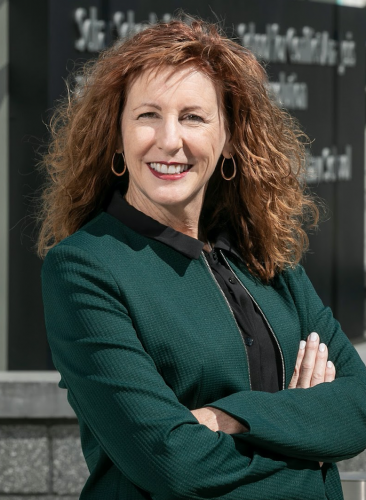
Paula Sorrell
Paula Sorrell
Associate Vice President of Innovation and Economic Development, George Mason University
In May, Sorrell was named associate vice president of innovation and economic development at George Mason University. There she is spearheading GMU’s experiential entrepreneurship programming in addition to placemaking for a slew of spaces, including the school’s business incubators and centers for women, veterans and small businesses. Her job responsibilities will expand significantly when GMU’s 450,000-square-foot Institute for Digital InnovAtion (IDIA) is complete in 2024. Her thoughts on the mammoth project:“It will be a beacon in the innovation district for entrepreneurship programming with our public, university and private sector partners, and include space for investors and tech companies to incubate.”
On Washington’s momentum: “Living and working in this incredible, fast-growing region is like riding the top of a wave.”
Words to live by: (credit to Bill Gates): “‘We always overestimate the change that will occur in the next two years and underestimate the change that will occur in the next ten.’ I like this because the long-term economic impact of entrepreneurship is often underestimated.”
Favorite app: “Pandora, on the Motown station.”
Fun fact: “I own a lot of power tools and use them frequently.”

Iyad Tarazi
Iyad Tarazi
President and CEO, Federated Wireless
Tarazi boasts an extensive resume, with a series of executive management positions at MCI (now Verizon), Nextel and most recently, Sprint. He took the plunge into the startup world and joined Federated Wireless, a wireless broadband network management platform that founded the Citizens Band Radio Service (CBRS) Alliance. Tarazi brought a knack for predicting industry trends and helped secure $51 million in Series C funding in 2019 and an additional $13.7 million in 2020. Access to high-speed broadband is now more coveted than ever.
On his switch to startups: “It’s actually quite liberating to take control of your own future. I’ve found that my worst day leading a startup is far better than my best day in a large corporation.”
Double trouble: “I am an identical twin and my brother and I are both executives in the tech industry. We often find ourselves at the same conferences. It’s always fun to see the double takes.”
Trend alert: “The government is supporting and promoting and creating innovation. This feels different to me than the past. From the federal government to local municipalities, school districts and hospitals—all of the public sector has become a leader in technology and that’s a big deal.”
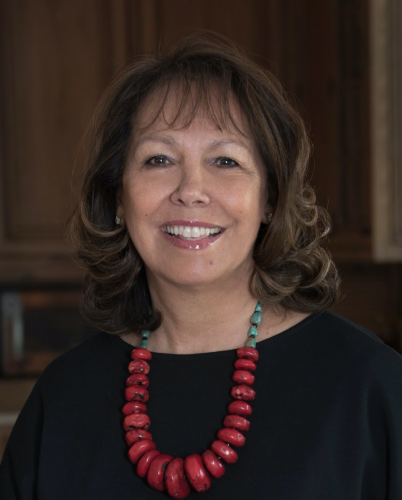
Vicki Vasques
Vicki Vasques
Founder and CEO, Tribal Tech LLC
Vicki Vasques’ advice to the American Indian/Alaska Native tribal women she mentors is to follow their passions with tenacity, vigilance and boldness. Mentorship is one of the services that her own business, Tribal Tech LLC, offers to these communities, in addition to management and technical consulting and federal government contracting. Through Tribal Tech, Vasques hopes to deliver resources that too often miss these communities. The firm has been named again on Inc. 5000’s list of America’s fastest growing private companies, and Vasques was recently honored at the Keystone Policy Center’s Leadership Awards Ceremony.
Virtually no difference: “When the pandemic hit, more than half of our employees were already teleworking, and the rest were able to start teleworking almost immediately.”
Guilty pleasure: “Everything Mackenzie-Childs. Under normal circumstances, I travel with friends each summer to their headquarters in Aurora, N.Y., glamp and attend their annual Barn Sale.”
Favorite tech toy: “My Pedego electric bike.”
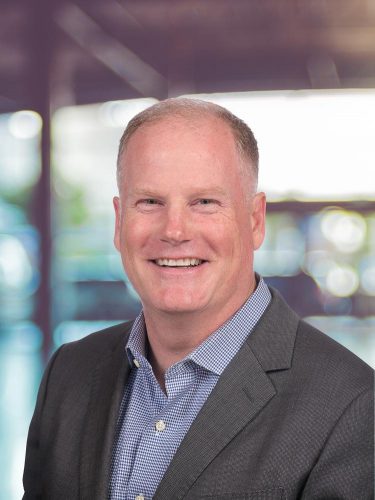
Marc Wallace
Marc Wallace
Co-Founder and CEO, Radius Networks
Radius Network’s location-based curbside and in-store pickup service, FlyBuy, changed from a “nice to have” to “must- have” feature over the course of a few months, CEO Marc Wallace explains of his Georgetown-based company’s cutting-edge technology and breakout year. “Think of it as an air-traffic-control-system for picking up goods at a restaurant, grocery or retail store,” he says. “We found that we could remove wasted time at the store and reduce customer and delivery driver wait time to seconds.” In the Covid era, such fast and frictionless service is especially valuable, but Wallace believes customer behavior won’t revert back because it’s “simply better than the old way.” In 2019, he was recognized as EY’s Entrepreneur Of The Year in the Mid- Atlantic region.
Favorite app: “‘Task Me’ (by Chris Sexton, our SVP of Engineering).”
Fun fact: “I am co-founder of District Taco which I started with my friend and neighbor 10 years ago as a food truck.”
Coolest tech trend right now: “Mobile phone Covid contact tracing.”
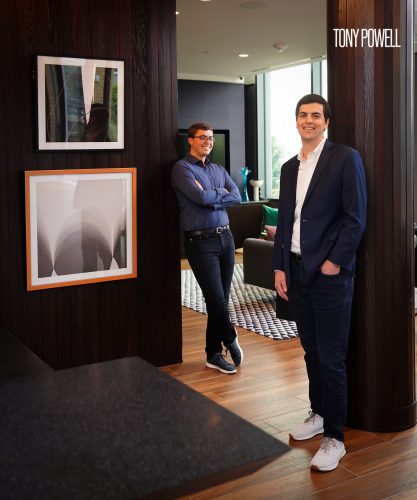
Jonathan Marks and Alex Wirth (Photo by Tony Powell).
Alex Wirth and Jonathan Marks
Co-Founder/CEO and Co-Founder/CTO, respectively; Quorum
Beyond the U.S. presidential race, an election year means potentially dozens of new federal legislators and hundreds of
new state officials. With Quorum’s data, organizations can quickly identify new legislative champions or threats to the issues they care about. Alex Wirth and Jonathan Marks founded the public affairs software platform in 2014, and it quickly became the District startup to watch year after year. Walmart, Coca-Cola, Apple, General Motors, Toyota, Lyft and the United Nations have all been counted as clients and the accolades followed with Wirth receiving the EY Entrepreneur of theYear award for Mid-Atlantic Emerging Companies.
Culture: Quorum has planned virtual game nights, pet costume contests, “Chopped” cooking challenges and a program where team members can expense dinner with a colleague if they eat outdoors and are socially distant. “We’ve always thought company culture is a big part of what makes Quorum special and this year has taught us it’s even more important than we could have imagined,” Wirth says.
Values: “‘Embrace the Rumble.’ Meaning: take a risk, be vulnerable, ask any type of question.”
On District innovation: “I love the ways that companies in the D.C. area collaborate with the government to modernize our democracy.”
Portraits taken at NOVEL South Capitol: With a confident eye for style, NOVEL South Capitol embraces the comforts of luxury apartment living and the convenience of a connected Southeast DC location. Discover sophisticated finishes and amenity spaces that deliver on elegance, hospitality, and unrivaled views when you start your next chapter here. 2 Eye St., SE; novelsouthcapitol.com




